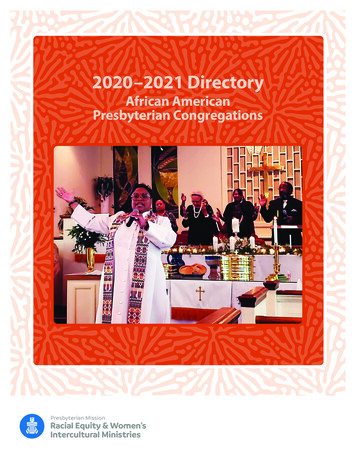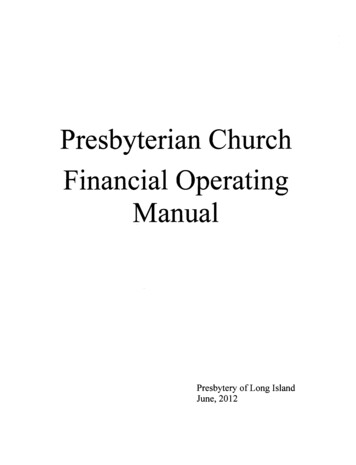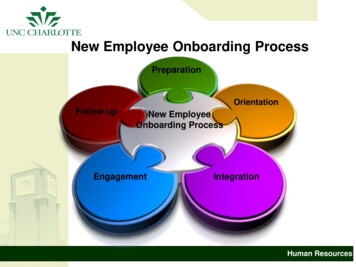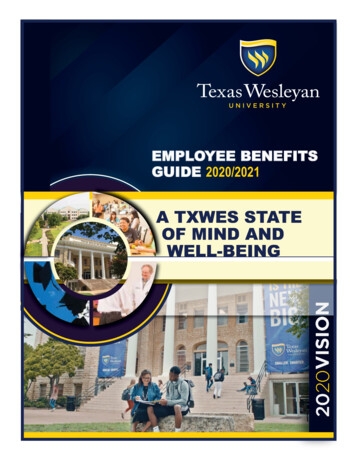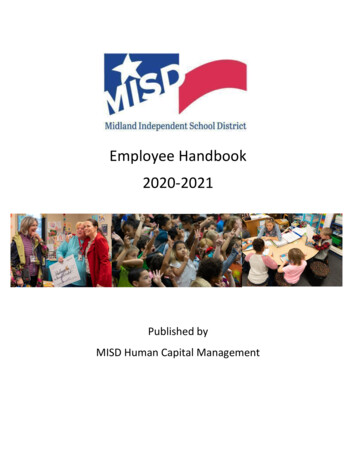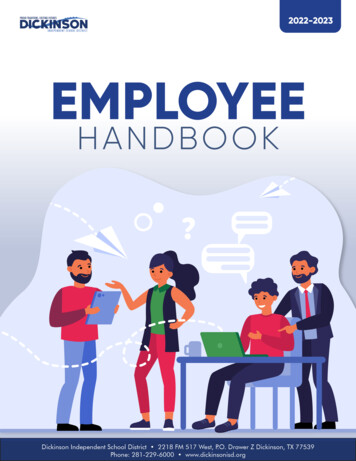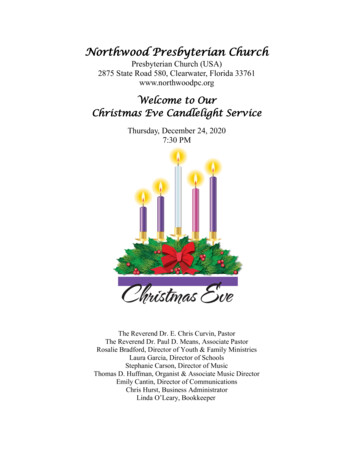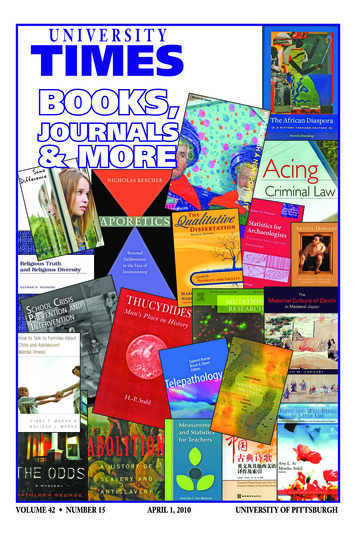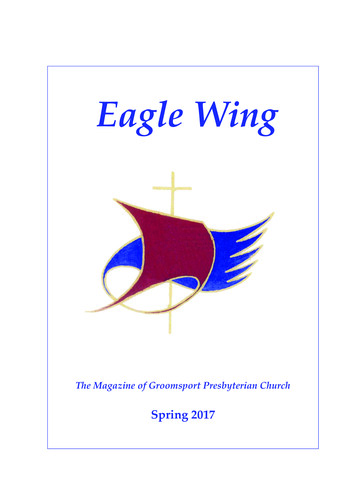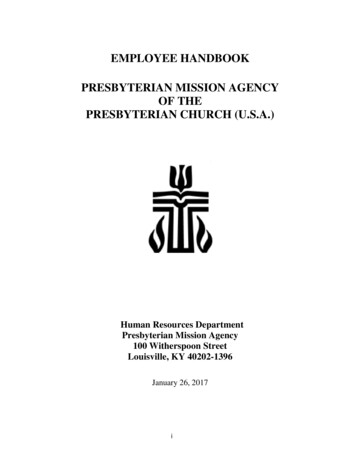
Transcription
EMPLOYEE HANDBOOKPRESBYTERIAN MISSION AGENCYOF THEPRESBYTERIAN CHURCH (U.S.A.)Human Resources DepartmentPresbyterian Mission Agency100 Witherspoon StreetLouisville, KY 40202-1396January 26, 2017i
TABLE OF CONTENTSTopicPageIntroduction . 1Presbyterian Mission Agency Employee Information . 1Mission Statement of the Presbyterian Mission Agency. 1The Mission of the Church . 1A Christian Philosophy of Employment . 4Standards of Ethical Conduct . 5100. Employment in General . 5101. Organization Values . 5102. Cultural Proficiency in the Workplace. 5103. Equal Opportunity and Affirmative Action. 6104. Employment at-Will . 6105. Ethics/Honoraria/Outside Employment . 6106. Immigration Law Compliance . . 7107. Confidential Information . . 7108. Personnel Records. 8200. Employment Status and Classifications . . .8201. Job Postings . . 8202. Employment Classifications. . 9203. Volunteers and Independent Contractors. . 10204. Employment References and Background Checks . 10205. Employment Applications . . 10206. Nepotism . 10207. Annual Performance Reviews . 11208. Job Descriptions . 11209. Elected or Appointed Persons Employment Ineligibility . 11210. Exempt Employee Relocation . 11211. New Employee Orientation . 14212. Compensation Administration . 14213. Other Compensation Stipulations. 14214. Employer 403(b) Contribution Program. 15215. Credited Service . 15216. Employment Separations . 16217. Separation Pay and Benefits. 17300. Benefits and Leaves . 19301. Benefits Eligibility . 19302. Vacation . 20303. Sick Leave . 22304. Emergency Leave . 23305. Holidays . 23306. Bereavement Leave . 24307. Jury Duty or Court Leave . 24308. Time Off to Vote . 24ii
309. Leave Without Pay . 24310. Short-Term Disability Leave and Long-Term Disability Insurance. 25311. Family and Medical Leave Act . 26312. Parental Leave . 31313. On the Job Injuries/Worker’s Compensation Leave . 32314. Marriage Leave . 32315. Military Leave . 32316. Employee Assistance Program . 33317. Study Leaves for Exempt Employees . 33318. Other Leaves for Exempt Employees . 34319. Employee Development . 35320. Involuntary Furlough . 37321. Retirement . 37322. Death in Service . 38400. Timekeeping/Payroll . 38401. Workweek/Work Hours . 38402. Pay Dates . 39403. Timekeeping/Overtime . 39404. Breaks/Lunch Period . 39405. Non-exempt Employee Travel. 40500. Workplace Conditions . 41501. Safety in the Workplace . 41502. Workplace Violence . 41503. Use of Telephones, Hand-held Devices and PMA Mail Delivery System . 42504. Smoking . 43505. Use of Equipment and Vehicles . 43506. Emergency Closings . 43507. Access to the Presbyterian Center . 44508. Business Travel . 44509. Communicable Disease and Pandemic Policy . 44600. Employee Conduct and Disciplinary Action . 50601. Employee Conduct, Work Rules and Performance . 50602. Alcohol and Drug Use. 52603. Attendance . 53604. Children in the Workplace . 53605. Employee Personal Public Witness . 54606. Participation in Public Demonstrations, at GA, PMAB or Related Committees. 55607. Role of Staff in Resourcing Meetings . 55608. Personal Property. 55609. Employer Property/Return of Employer Property . 55610. Copyright Policy . 56611. Technology Policy . 56612. Social Media Policy . 58613. Privacy. 59614. Anti-Discrimination and Anti-Harassment Policy . 59615. Procedures for Reporting Any Form of Discrimination or Harassment . 61616. Sexual Misconduct . 63617. Grievance and Appeal Procedure . 64iii
700. Teaching Elders . 66701. Terms of Call/Notification and Consultation with Presbytery . 66702. Manse/Housing Allowance . 67703. General. 68704. Credited Service for Teaching Elders . 68705. Withholding. 68706. Reporting of Policy Violations . 68Definitions and Acronyms. 69Appendices. 70Appendix 1. PCUSA Sexual Misconduct Policy And Its Procedure . 70Appendix 2. Standards of Ethical Conduct for Employees and Volunteers . 85iv
INTRODUCTIONThis Employee Handbook provides information related to employment, benefits, and working conditions foremployees of the Presbyterian Church (U.S.A.), A Corporation, who work for the Presbyterian MissionAgency. The terms “Employer,” “Presbyterian Mission Agency,” “PMA”, and “Presbyterian Church (U.S.A.), ACorporation” are used interchangeably in this Employee Handbook to denote the employing organization.This Handbook does not apply to employees of the OGA nor to Mission Personnel and Mission Volunteers,except as indicated in their respective policies or handbooks. This Handbook and any future revisions to itrevoke and supersede any and all policies and handbooks that existed prior to the issuance date of thisHandbook.The policies in this Handbook are consistent with the Book of Order of the PCUSA. There may be somevariation in policy and/or practice based on location of the work site. This Handbook is neither a contract ofcontinued employment nor a legal document nor a contract to provide specific compensation or benefits nor aguarantee of continued employment.No Employee Handbook can anticipate every circumstance or question about policy. The need may arise andthe Employer reserves the right, directly or through the Leadership Cabinet, to revise, supplement, or rescindany policies or portion of this Handbook, from time-to-time, as it deems appropriate, in its sole and absolutediscretion, with the exception of the employment-at-will policy permitting you or the Employer to end youremployment relationship for any reason or no reason, at any time, with or without notice. Employees will, ofcourse, be notified of changes to this Handbook as soon as practicable after they occur through postings onemployee information locations, such as CenterNet. Nothing in these policies will be enforced which violatesapplicable laws and/or GA mandates.If the Leadership Cabinet approves changes to the Handbook, the changes become effective upon theLeadership Cabinet’s vote. The Director of HR will report any substantive changes made by the LeadershipCabinet to the next meeting of the PMA Board's (“PMAB”) Personnel and Nominating Committee. ThePersonnel and Nominating Committee need not act regarding changes reported to it. If, however, it disagreeswith a change and deems a revision necessary, the Personnel and Nominating Committee may recommendrevisions to the PMAB. The Personnel and Nominating Committee or the PMAB may revise the Handbook atany time.Presbyterian Mission Agency Employee InformationMission Statement of the Presbyterian Mission AgencyThe Presbyterian Mission Agency is called to inspire, equip, and connect the PC(USA) in its manyexpressions to serve Christ in the world through new and existing communities of faith, hope, love andwitness.The Mission of the Church (Book of Order F-1.00)F-1.01 GOD’S MISSIONThe good news of the Gospel is that the triune God—Father, Son, and Holy Spirit—creates, redeems,sustains, rules, and transforms all things and all people. This one living God, the Scriptures say, liberated thepeople of Israel from oppression and covenanted to be their God. By the power of the Spirit, this one livingGod is incarnate in Jesus Christ, who came to live in the world, die for the world, and be raised again to new1
life. The Gospel of Jesus Christ announces the nearness of God’s kingdom, bringing good news to all whoare impoverished, sight to all who are blind, freedom to all who are oppressed, and proclaiming the Lord’sfavor upon all creation. The mission of God in Christ gives shape and substance to the life and work of theChurch. In Christ, the Church participates in God’s mission for the transformation of creation and humanity byproclaiming to all people the good news of God’s love, offering to all people the grace of God at font andtable, and calling all people to discipleship in Christ. Human beings have no higher goal in life than to glorifyand enjoy God now and forever, living in covenant fellowship with God and participating in God’s mission.F-1.0205 Christ Is The Foundation Of The ChurchIn Christ All The Fullness Of God Was Pleased To Dwell, And Through Christ God reconciles all things,whether on earth or in heaven, making peace by the blood of the cross (Col. 1:19–20). In Christ’s name,therefore, the Church is sent out to bear witness to the good news of reconciliation with God, with others, andwith all creation. In Christ the Church receives its truth and appeal, its holiness and its unity.F-1.03 THE CALLING OF THE CHURCHF-1.0301 The Church Is the Body of ChristThe Church is the body of Christ. Christ gives to the Church all the gifts necessary to be his body. TheChurch strives to demonstrate these gifts in its life as a community in the world (1 Cor. 12:27–28): The Church is to be a community of faith, entrusting itself to God alone, even at the risk of losing itslife.The Church is to be a community of hope, rejoicing in the sure and certain knowledge that, in Christ,God is making a new creation. This new creation is a new beginning for human life and for all things.The Church lives in the present on the strength of that promised new creation.The Church is to be a community of love, where sin is forgiven, reconciliation is accomplished,and the dividing walls of hostility are torn down.The Church is to be a community of witness, pointing beyond itself through word and work to thegood news of God’s transforming grace in Christ Jesus its Lord.F-1.0302 The Marks of the ChurchWith all Christians of the Church catholic, we affirm that the Church is “one, holy, catholic, and apostolic.”F-1.0302b. The Holiness of the ChurchHoliness is God’s gift to the Church in Jesus Christ. Through the love of Christ, by the power of the Spirit, Godtakes away the sin of the world. The holiness of the Church comes from Christ who sets it apart to bearwitness to his love, and not from the purity of its doctrine or the righteousness of its actions. Because inChrist the Church is holy, the Church, its members, and those in its ordered ministries strive to lead livesworthy of the Gospel we proclaim. In gratitude for Christ’s work of redemption, we rely upon the work ofGod’s Spirit through Scripture and the means of grace (W-5.5001) to form every believer and everycommunity for this holy living. We confess the persistence of sin in our corporate and individual lives. At thesame time, we also confess that we are forgiven by Christ and called again and yet again to strive for thepurity, righteousness, and truth revealed to us in Jesus Christ and promised to all people in God’s newcreation.2
F-1.0302d. The Apostolicity of the ChurchApostolicity is God’s gift to the Church in Jesus Christ. In Christ, by the power of the Spirit, God sends theChurch into the world to share the gospel of God’s redemption of all things and people. Because in Christ theChurch is apostolic, it strives to proclaim this gospel faithfully. The Church receives the good news ofsalvation in Jesus Christ through the testimony of those whom Christ sent, both those whom we call apostlesand those whom Christ has called throughout the long history of the Church. The Church has been and iseven now sent into the world by Jesus Christ to bear that testimony to others. The Church bears witness inword and work that in Christ the new creation has begun, and that God who creates life also frees those inbondage, forgives sin, reconciles brokenness, makes all things new, and is still at work in the world. To bemembers of the body of Christ is to be sent out to pursue the mission of God and to participate in God’s newcreation, God’s kingdom drawing the present into itself. The Presbyterian Church (U.S.A.) affirms the Gospelof Jesus Christ as received from the prophets and apostles, and stands in continuity with God’s missionthrough the ages. The Church strives to be faithful to the good news it has received and accountable to thestandards of the confessions. The Church seeks to present the claims of Jesus Christ, leading persons torepentance, acceptance of Christ alone as Savior and Lord, and new life as his disciples. The Church is sentto be Christ’s faithful evangelist: making disciples of all nations in the name of the Father, the Son, and the Holy Spirit;sharing with others a deep life of worship, prayer, fellowship, and service; andparticipating in God’s mission to care for the needs of the sick, poor, and lonely;to free people from sin, suffering, and oppression; and to establish Christ’s just, loving, andpeaceable rule in the world.F-1.0303 The Notes of the Reformed ChurchWhere Christ is, there is the true Church. Since the earliest days of the Reformation, Reformed Christianshave marked the presence of the true Church wherever: the Word of God is truly preached and heard,the Sacraments are rightly administered, andecclesiastical discipline is uprightly ministered.In our own time, we affirm that, in the power of the Spirit, the Church is faithful to the mission of Christ as it: Proclaims and hears the Word of God,o responding to the promise of God’s new creation in Christ, ando inviting all people to participate in that new creation;Administers and receives the Sacraments,o welcoming those who are being engrafted into Christ,o bearing witness to Christ’s saving death and resurrection,o anticipating the heavenly banquet that is to come, ando committing itself in the present to solidarity with the marginalized and the hungry; andNurtures a covenant community of disciples of Christ,o living in the strength of God’s promise ando giving itself in service to God’s mission.3
F-1.0404 OpennessIn Jesus Christ, who is Lord of all creation, the Church seeks a new openness to God’s mission in the world.In Christ, the triune God tends the least among us, suffers the curse of human sinfulness, raises up a newhumanity, and promises a new future for all creation. In Christ, Church members share with all humanity therealities of creatureliness, sinfulness, brokenness, and suffering, as well as the future toward which God isdrawing them. The mission of God pertains not only to the Church but also to people everywhere and to allcreation. As it participates in God’s mission, the Presbyterian Church (U.S.A) seeks: a new openness to thesovereign activity of God in the Church and in the world, to a more radical obedience to Christ, and to a morejoyous celebration in worship and work; a new openness in its own membership, becoming in fact as well asin faith a community of women and men of all ages, races, ethnicities, and worldly conditions, made one inChrist by the power of the Spirit, as a visible sign of the new humanity; a new openness to see both thepossibilities and perils of its institutional forms in order to ensure the faithfulness and usefulness of theseforms to God’s activity in the world; and a new openness to God’s continuing reformation of the Churchecumenical, that it might be more effective in its mission.A Christian Philosophy of EmploymentThe Presbyterian Church (USA) is a community of faith called into being by God's grace in Jesus Christ. It ismade up of people called by God into a covenant relationship where the gifts of God's people are recognizedand used for the purposes of God. The Church seeks to order its institutional life by the biblical andtheological themes that give it purpose and mission. These include: God as Creator In creating a good world, God also created human beings to continue this good work. Human Vocation - Human beings have as their chief end to glorify God and enjoy God forever. Thisinvolves a lifelong response in all aspects of life. Work, paid and unpaid, is an integral part of thebeliever's response to God's call. By working with integrity and responsibility toward all our neighborsand all of creation; by treating other workers and ourselves with respect, compassion, and gratitude;and by seeking forgiveness from God for imperfections in work, we engage in work pleasing to God.Our work thereby becomes a service to our neighbors and their work a service to us. Sinfulness - In the fallen human state, sinfulness can be manifested in individual sloth, dishonesty,exploitation of others or lack of charity. It can also take institutional patterns of discrimination andoppression. These various forms of sinfulness need to be confessed to a gracious God andaddressed in law and policy. The Church as Community - The Church, as a witness to God's redemptive work, seeks to organizeits institutional life in ways that reflect its theological visions of the Church. Although tension willcontinue to exist between the understanding of the Church as a community and as an institution, thedirection is clear. It seeks to make work not a burden but a glad and collaborative response to Jesus'transformative life. It seeks to reflect God's creative and redemptive purposes in all life by providingnot only a means of subsistence but also a way to honor human dignity and participate in communitylife. It seeks for its structure to reflect its policy: one that places a high value on participation and4
diverse representation in decision making and avoids decisions imposed by individuals. It seeks tocultivate an environment where people support one another, utilize their gifts creatively andproductively, and embody the love and openness of Jesus Christ.The Employer strives to set an example of a work community built on faith which: recognizes the gifts of individuals; encourages individuals and groups to their best work; compensates fairly for work performed; recognizes the synergy and justice of a diverse workforce; supports individuals and families; models stewardship through efficiency and careful use of resources.Standards of Ethical ConductIn 1998 the 201st GA adopted Standards of Ethical Conduct for employees and volunteers of the PCUSA, acopy of which is included in this Handbook at Appendix 2.100. EMPLOYMENT IN GENERAL101. Organization ValuesThe PMA is a caring, compassionate, and inclusive community called by God to fulfill the mandates of thePresbyterian Church (U.S.A.) Constitution, serving and leading the people of God through resources,programs, and initiatives, and the church of Jesus Christ through partnerships with our colleagues,congregations, governing bodies, and ecumenical partners.Our vision to become a culturally proficient organization is based on these shared values: We believe our purpose is to glorify and serve God, and that God’s grace inspires us to bring God’slove, justice, and reconciliation into a diverse world.We believe we provide a living expression of the gospel when we honor God’s gift of diversity,respecting and encouraging the good in each of us.We believe seeking God’s will is integral to our decision-making process.We believe employing honesty, integrity, and respect in our conversations and interactions with ourcolleagues and our constituencies create and foster trust.We believe working with competence, in consultation and in partnership with others, is the best wayto serve those within and outside the Presbyterian Center.We believe we do our best and most productive work when we are encouraged to use our individualgifts, talents, and creativity in the achievement of our shared goals and objectives.We believe a balanced life, with time for work, leisure, and spiritual nature, makes us healthier andmore productive colleagues at the Presbyterian Center.102. Cultural Proficiency in the WorkplaceThe PMA values diversity in the workplace and to that end instituted a cultural proficiency program. Culturalproficiency supports policies, practices, values and behaviors that allow individuals and organizations toeffectively interact and address issues of difference. Employees are encouraged to become familiar with theabove values and strive to incorporate culturally proficient standards of behavior into their work for the PMA.5
103. Equal Opportunity and Affirmative ActionThe PMA engages in employment policies and practices that promote equality of opportunity in all aspects ofemployment. In developing this Handbook, the PMA is guided by the Book of Order, the policies of the GA,the Presbyterian Church (U.S.A.) Churchwide Policy For Equal Employment Opportunity And AffirmativeAction For General Assembly Agencies Cultural Proficiency Standards of Behavior, applicable federal, stateand l
This Employee Handbook provide information related to employment, benefits, and working conditions s for employees of the Presbyterian Church (U.S.A.), A Corporation, who work for the Presbyterian Mission Agency. The terms "Employer," "Presbyterian Mission Agency," "PMA", and "Presbyterian Church (U.S.A.), A
